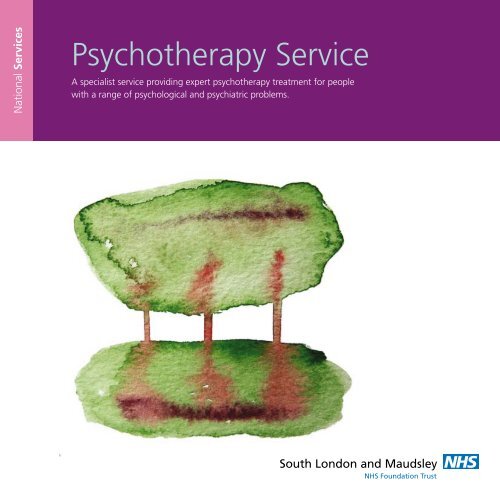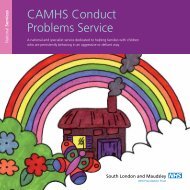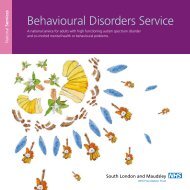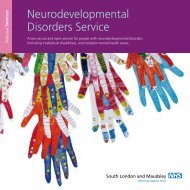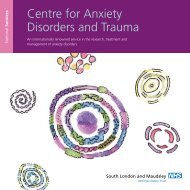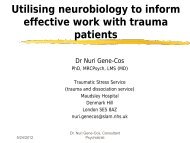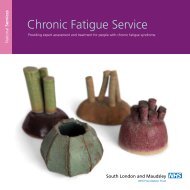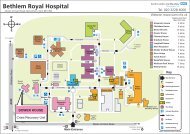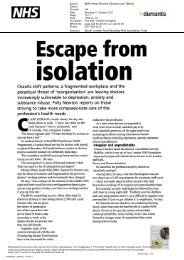Psychotherapy Service booklet - SLaM National Services
Psychotherapy Service booklet - SLaM National Services
Psychotherapy Service booklet - SLaM National Services
You also want an ePaper? Increase the reach of your titles
YUMPU automatically turns print PDFs into web optimized ePapers that Google loves.
South London and Maudsley NHS Foundation Trust» The <strong>Psychotherapy</strong> <strong>Service</strong> has made a huge difference to thequality of each day. I’ve started to feel pleasure again. « KerryCover illustration drawn by Ben Haydon, former <strong>SLaM</strong> patient2
<strong>National</strong> <strong>Service</strong>s: <strong>Psychotherapy</strong> <strong>Service</strong>Contents<strong>Service</strong> overview 4Our philosophy 5Who is our service for? 6Interventions 8Our care pathway 12Outcomes 14Our facilities 16Our team 17Training and consultancy 25Case studies 26Referring to our service 30 3
South London and Maudsley NHS Foundation Trust<strong>Service</strong> overviewOur service specialises in the assessment and treatment of people with a broad rangeof psychological and psychiatric problems.We offer a range of evidence-based therapies and workcollaboratively with patients and referrers. We work toensure our service is continually evolving and improving.Our expert clinicians provide a responsive psychotherapyservice, tailored to the needs of the individual, coupleor family in treatment.King’s Health PartnersOur service is part of the Mood, Anxiety and PersonalityDisorders Clinical Academic Group. <strong>SLaM</strong> has joined with King’sCollege London, Guy’s and St Thomas’ NHS Foundation Trust,and King’s College NHS Foundation Trust to establish King’sHealth Partners, an Academic Health Sciences Centre. King’sHealth Partners involves bringing clinical care, research andeducation much more closely together. Our aim is to reduce thetime it takes for research discoveries and medical breakthroughsto become routine clinical practice. This will lead to better careand treatment for patients.Visit www.kingshealthpartners.org for more information.4
<strong>National</strong> <strong>Service</strong>s: <strong>Psychotherapy</strong> <strong>Service</strong>Our philosophyOur priority is to listen to our patients and offer them the best psychotherapy tailoredto each person’s needs.As a world-class service offering different modalitiesof psychotherapy, we aim to provide the best treatmentfor each person.» The service provides invaluable support tothose who need it, and in certain cases hasundoubtedly been a lifesaver. I know that ithas become a critical lifeline for me. « Jerry 5
South London and Maudsley NHS Foundation TrustWho is our service for?We provide a service for people with a range of mental health problems, including depression,anxiety and personality disorders. We also provide specialised therapy for couples, pregnantwomen or women with children up to 12 months old, and people with a variety of emotionaland relationship difficulties.Eligibility›› 18+ years›› People struggling with chronic psychosis›› CBT: focal problems like anxiety or depression›› Family therapy: problems located primarily in couple orfamily relationships›› Perinatal: mothers or fathers with infants
<strong>National</strong> <strong>Service</strong>s: <strong>Psychotherapy</strong> <strong>Service</strong> 7
South London and Maudsley NHS Foundation TrustInterventionsOur interventions are designed to address a broad range ofdifficulties faced by our patients, and to provide the besttreatment for each person’s needs.Our service offers:›› Cognitive behaviour therapy›› Couple and family therapy›› Group psychotherapy›› Individual psychodynamic psychotherapy›› Mentalization-based therapy›› Mindfulness-based cognitive therapy›› Perinatal psychotherapy›› Psychosis groupCognitive behaviour therapy (CBT)We provide expert CBT for people with complex cases,including treatment-resistant anxiety and depression, whooften have co-existing personality difficulties. CBT is ashort-term, problem-focused treatment based on thepresumption that emotional problems are maintained bycognitive and behavioural factors. People learn to evaluatetheir thoughts, beliefs and behaviours, and try alternativeways of thinking and acting.Couple and family therapyWe see families or couples where there is often mental illnessin one or more family member and relationships are part ofthe difficulties. Therapy helps to clarify how the relationshipsand symptoms impact on each other, and helps families usetheir own resources and strengths to relate moreconstructively.Group psychotherapyGroup psychotherapy is helpful for the same rangeof disorders. It is especially useful for those who havedifficulties in relationships with others.Individual psychodynamic psychotherapyPeople benefiting from this form of therapy often havedifficulties in relationships or in handling the pressures ofeveryday living. Some people have depression, an eatingdisorder, a psychotic condition or are struggling with selfharm.Many people have been affected by psychological,physical or sexual abuse. We also provide assessment andmentalization-based treatment for people with borderlinepersonality disorder.Mentalization-based therapyThis therapy is for people with a main diagnosis of borderlinepersonality disorder. Mentalization therapy relates to thecapacity to interpret one’s and other people’s actions,thoughts and emotions as meaningful on the basis of differentand independent personal intentions and motivations. Thetherapy has been shown to reduce deliberate self-harm,inpatient admissions and the management costs of thesepatients. It has also been shown to increase social andinterpersonal functioning. The improvements have beenshown to be maintained after eight years.Mindfulness-based cognitive therapyMindfulness-based cognitive therapy (MBCT) is a combinationof meditation and cognitive behavioural group therapy, whichhelps people become aware of how their thinking influencestheir thoughts and feelings. It is a group therapy, includingmeditation, where participants are invited to talk about theirpersonal experiences. Studies have shown MBCT interventions8
<strong>National</strong> <strong>Service</strong>s: <strong>Psychotherapy</strong> <strong>Service</strong>can help to keep depression away in people who haveexperienced three or more episodes of the illness.Perinatal psychotherapyWe see pregnant women or women with children under theage of 12 months, who are having psychological difficultiesadjusting to this life change.<strong>Psychotherapy</strong> can be undertaken in a group, individually,or in the form of parent-infant psychotherapy, which isoffered when the difficulties are evident in the mother-infantor father-infant relationship.Psychosis groupWe provide open group therapy for people with severe andenduring mental health problems. People referred to thegroup vary in their diagnoses, but often have bipolar affectivedisorder, schizophrenia or severe borderline disorders.We facilitate contact between members outside of the group,as well as addressing the symptoms of people’s illness andhow they affect the group member. We encourageengagement in psychosocial activities, like alternativetherapies, taking part in community art groups, or undertakingvoluntary work, which are all aimed at enhancing people’spersonal empowerment and social inclusion. 9
South London and Maudsley NHS Foundation TrustOur care modelFAMILY AND CARERS›› Joint understanding of the illness›› Improved communication›› Management of daily interactions at homeASSESSMENT›› Monospeciality or multimodal assessments›› Psychiatric and psychometric evaluation›› Complex needs assessments›› Routine use of HoNOS and COREPATIENT›› Personalised and continued care›› A collaborative effort with the therapist›› Reduction in symptoms›› Improved relationships and social functioning›› New ways of understanding themselves›› Time to be listened to›› Improved communication with others›› A different sense of control over one’s lifeTHERAPIES›› Cognitive behavioural therapy (CBT)›› Family, couple and systemic therapy›› Group therapy›› Mentalization-based therapy›› Mindfulness-based cognitive therapy›› Perinatal psychotherapy›› Psychoanalytic and psychodynamic therapyRISK MANAGEMENT›› Child and parenting assessment›› Risk assessment and recommendations›› Psychological and psychiatric risk assessment›› Planning of shared care with GPs and CMHTs10
<strong>National</strong> <strong>Service</strong>s: <strong>Psychotherapy</strong> <strong>Service</strong>» The MBCT course I took was invaluable. It built on previous psychotherapeuticinterventions I have benefited from within <strong>SLaM</strong> and provided me with manyuseful tools. These have been a great help. I have recommended the courseto others I believe will benefit from it. « Karen 11
South London and Maudsley NHS Foundation TrustOur care pathwayReferral received withfunding approvalAssessmentReport and care plan sentto GP and patientCBT, couple and family therapy,group psychotherapy, individualpsychodynamic psychotherapy,mentalization-based therapy,mindfulness-based cognitive therapyor perinatal psychotherapyReferral elsewhereif neededNot suitable for treatment,referred elsewhereJoins waiting listProgress report to GPand patientDischarge to GP12
<strong>National</strong> <strong>Service</strong>s: <strong>Psychotherapy</strong> <strong>Service</strong> 13
South London and Maudsley NHS Foundation TrustOutcomesThis graph illustrates the significant reduction in patients’anxiety and depression symptoms over six months as a resultof CBT treatment with the service (2010).Patients experienced a drop in depressive symptoms, basedon the Patient Health Questionnaire, and an equally significantreduction in anxiety symptoms when measured using theGeneralised Anxiety Disorder Assessment.CBT FOR ANXIETY AND DEPRESSION16141210» I personally found the one-to-onetherapy most useful. « Michael86Before CBTAfter CBTPatient Health Questionaire (PHQ-9)Generalised Anxiety DisorderAssessment (GAD-7)14
<strong>National</strong> <strong>Service</strong>s: <strong>Psychotherapy</strong> <strong>Service</strong> 15
South London and Maudsley NHS Foundation TrustOur facilitiesOur service is located at the historic Maudsley Hospital, which is internationally renowned forexcellence in research, treatment and teaching in mental health. The hospital is based in SouthLondon and has close links to public transport.16
<strong>National</strong> <strong>Service</strong>s: <strong>Psychotherapy</strong> <strong>Service</strong>Our teamOur specialist team includes consultant psychiatrists, psychologists and psychotherapists.Dr Stirling Moorey BSc, MBBS, FRCPsychHead of <strong>Psychotherapy</strong>Dr Stirling Moorey is Professional Head of <strong>Psychotherapy</strong> forthe Trust. He is also a consultant psychiatrist in CBT and anhonorary senior lecturer at the Institute of Psychiatry, King’sCollege London.BackgroundDr Moorey trained in medicine at the Middlesex HospitalMedical School, and in psychiatry at the Maudsley Hospital.From 1986 to 1992, he was a research psychiatrist atthe Royal Marsden Hospital. From 1992 to 1999, he wasa consultant psychiatrist in psychotherapy at City andHackney Teaching Primary Care Trust.Dr Moorey became interested in cognitive therapy at medicalschool, and in 1979 he did his student elective with Dr AaronBeck at the Centre for Cognitive Therapy – being one of thefirst British therapists to visit when CBT was in its infancy.Since then, he has been closely involved in CBT trainingfor psychiatrists and other health professionals.ResearchResearch interests include CBT in palliative care, witha particular interest in how palliative care staff can learnto use techniques in their everyday work. 17
South London and Maudsley NHS Foundation TrustOur team continuedDr Julia Bland MA, MB, BS, MRCPsychPsychoanalytic Psychotherapist | Systemic Family andCouple TherapistDr Julia Bland is a Psychoanalytic Psychotherapist, a SystemicFamily and Couple Therapist, and the Lead Clinician for familyand couple therapy.BackgroundDr Bland has an honours degree in English Language andLiterature from the University of Oxford.She completed her medical training at Guy’s Hospital, beforecompleting psychiatric and specialist psychotherapy seniorregistrar training at South West London and St George’sMental Health NHS Trust.She qualified in systemic psychotherapy at Prudence SkynnerFamily Therapy Clinic, a facility that is registered with the UKCouncil for <strong>Psychotherapy</strong> (UKCP). She then qualified inpsychoanalytic psychotherapy at Lincoln Clinic and Centre for<strong>Psychotherapy</strong>, registered with the British PsychoanalyticCouncil (BPC).ResearchDr Bland is lead investigator for a research group developingan outcome measure for systemic family therapy (SCORE), aproject supported by the Association for Family Therapy. Shehas a research interest in the interface between systemic andpsychoanalytic theory and has been involved in demographic,descriptive and outcome studies related to doctors’ use of theMedNet service.18
<strong>National</strong> <strong>Service</strong>s: <strong>Psychotherapy</strong> <strong>Service</strong>Dr Caroline McCurrie MA, MBBS, MRCPsychConsultant PsychiatristDr Caroline McCurrie is a Consultant Psychiatrist in<strong>Psychotherapy</strong>, with a particular specialism in psychodynamicpsychotherapy. She is also a cognitive analytic therapypractitioner and has trained in interpersonal psychotherapyand mentalization-based therapy. She is the deputypsychotherapy tutor for the Trust, training junior medical staffin psychotherapy. She offers case discussion groups for staffas well as supervision and direct teaching.BackgroundDr McCurrie completed her psychiatric training within theTrust, including specialty training in <strong>Psychotherapy</strong>.Clinical InterestsDr McCurrie has a particular interest in training staff inpsychotherapy and supporting staff in working with complexpatients. Other interests include parent mental health and theinterface of psychotherapy services with other health servicesboth in primary and secondary care. 19
South London and Maudsley NHS Foundation TrustOur team continuedJack Nathan BSc (Hons), CQSW, MSc, Mem. LCP, Mem. BPCConsultant PsychotherapistJack Nathan is a consultant psychotherapist for the<strong>Psychotherapy</strong> <strong>Service</strong> and the Self-harm <strong>Service</strong>. He alsoholds the post of senior lecturer in social work at theInstitute of Psychiatry, King’s College London.During his career, he has developed a form of short-termpsychotherapy treatment called Brief-Intermittent Dynamic(BID) Therapy.BackgroundHe completed degrees at London University, includinga Masters in Social Work (1980). He then trained as an adultpsychotherapist at the London Centre for <strong>Psychotherapy</strong>.ResearchResearch interests include self-harm, advanced practicesocial work, BID therapy and the nature of supervision.20
<strong>National</strong> <strong>Service</strong>s: <strong>Psychotherapy</strong> <strong>Service</strong>Wil Pennycook MA, Memb.Inst.GA (London)Consultant PsychotherapistWil Pennycook is a group analyst and the lead clinicianfor group psychotherapy.In her role, she has developed groups for a variety of patientpopulations. At present she conducts two outpatient groups,co-conducts a group for patients with severe and enduringmental illness, and co-leads a mentalization-based therapy(MBT) project for patients with borderline personality disorder.She is experienced in conducting and supervising inpatientgroups in both acute and forensic settings. She has facilitatedstaff groups in both of these settings and currently facilitatesa staff group on a forensic ward.Wil is responsible for developing group psychotherapy withinthe department and she supervises the training of juniordoctors and others in group psychotherapy.She regularly presents at CPD workshops within the Trust.Past presentations have included Group <strong>Psychotherapy</strong> andAddictions and Working with Staff on a Forensic Ward.BackgroundWil trained to work therapeutically with children andadolescents at the Tavistock Clinic and University of London.She began her training as a Group Analyst in 1991 andmoved to the Maudsley Hospital in 2002.ResearchWil is co-leading a research project on mentalization-basedtreatment for patients with borderline personality disorder.She is also involved in developing research into grouppsychotherapy within the NHS, alongside the Instituteof Group Analysis. 21
South London and Maudsley NHS Foundation TrustOur team continuedDr Giovanni Polizzi MMRCPsych, MInst PsychoanalConsultant PsychiatristDr Giovanni Polizzi is a consultant psychiatrist in psychotherapy.He is the lead for mentalization-based therapy with the serviceand Deputy Head for the Trust’s psychotherapy training andeducation programme.BackgroundDr Polizzi studied in Italy, qualifying first as a neurologistwith a special interest in epilepsy. He started working inLondon as a researcher with the Epilepsy Research Group,Institute of Neurology, before deciding to concentrate onhis earlier passion for psychoanalysis and psychiatry.Dr Polizzi completed the Royal College of Psychiatry(MRCPsych) training while he was working at the SouthWest London and St George’s Mental Health Trust.His higher training in psychotherapy was completedat Springfield Hospital. He trained as a psychoanalystat the Institute of Psychoanalysis, London.He was appointed to his consultant post at the MaudsleyHospital in 2005.ResearchDr Polizzi’s main interest is the development of skills andknowledge in the field of personality disorders. His researchincludes mentalization-based therapy in outpatient workwith patients who have borderline personality disorders.Previous research interests include functional neuroimagingand electroencephalography (EEG) recordings, and primarycare and psychotherapy.22
<strong>National</strong> <strong>Service</strong>s: <strong>Psychotherapy</strong> <strong>Service</strong>Dr Florian Ruths MD, MRCPsych, PgDipCBTConsultant PsychiatristDr Florian Ruths is clinical lead for mindfulness-based therapy.He is a consultant psychiatrist in adult mental health inLambeth and is part of the South East Lambeth Assessmentand Treatment Team.BackgroundDr Ruths qualified in Heidelberg as a doctor and trained inPsychiatry at the Royal Free Hospital before moving to theMaudsley Hospital for specialist registrar training in GeneralAdult and Old Age Psychiatry in 2000.He became a qualified cognitive therapist and was BABCPaccredited. Since 2003, he has developed the mindfulnessbasedcognitive therapy program at the Maudsley Hospitaland has been a full-time consultant at the hospital since 2005.ResearchResearch interests include mindfulness and CBT. Previousinterests include mindfulness-based cognitive therapy,obsessive compulsive disorder and self-harm. 23
South London and Maudsley NHS Foundation TrustOur team continuedDr Barbara Wood MBBS, MRCP, MRCPsychConsultant PsychiatristDr Barbara Wood is a consultant psychiatrist in psychotherapy.BackgroundDr Wood trained in medicine at St Bartholomew’s Hospital,London. She completed postgraduate physician training atSt Bartholomew’s and Whipps Cross Hospitals, and psychiatrytraining at the Maudsley Hospital and in Victoria, Australia.Clinical interestDr Wood has a particular interest in psychotherapy servicesfor younger adults.ResearchHer interests include mother-child attachment and outcomesof psychotherapy.24
<strong>National</strong> <strong>Service</strong>s: <strong>Psychotherapy</strong> <strong>Service</strong>Training and consultancyWe regularly run 18-month clinical and theoretical borderlineworkshops for mental health professionals working within <strong>SLaM</strong>or as honorary therapists. A number of other clinical andeducational activities, including academic seminars and filmson psychopathology, are regularly offered to professionalsworking within the Trust and to psychiatrists in training. 25
South London and Maudsley NHS Foundation TrustKerry“ I’ve always had a sense things were notquite right.”I’ve suffered from depression and anxiety since childhoodand, though I think I always knew something was wrong,I felt I was to blame for it... like all I really needed to dowas pull my socks up.I grew up as the eldest child in a working class Muslimfamily and, around the age of 37 or 38, when I soughthelp for the first time, my siblings seemed to be doingso much better than me. They were married with homesand savings and I was single and felt I hadn’t doneanything with my life. I’d passed a couple of degreesand had worked in publishing and different areas of law,but hadn’t been able to hold down a steady career.My siblings and I had all come through the same familyso I wondered what was wrong with me.I reflected on it and came to the conclusion that I setgoals but never achieved them. That was probably thething that made me look for help initially; why did I setmy sights on things but never get there?“ I suppose it’s more difficult when thereare no external signs.”On the face of it, I’ve always looked quite well. Thedepression may have affected me inside, but most of thetime I probably looked cheerful on the outside. I slepta lot too, but I always felt that was just a mixture of badhabits and not feeling motivated.My situation had been the same since secondary schoolor earlier so there wasn’t any kind of onset in adulthood.My sister took antidepressants when she went througha divorce, but taking the medication was a result of anobvious change in her well-being. That never happenedfor me. I’d been the same for a long time – chronic, likea kind of shutdown.At first, I saw a counsellor linked to my GP surgery andhad some psychotherapy from a local pastoral service.I was with the pastoral service for a while and it was quitesuccessful in some ways because it revealed childhoodthings I didn’t realise still upset me, plus it was clearto me that something was wrong. I was looking fora different kind of service though, which was why Iwas referred to the Maudsley.“ The Maudsley offer all types of therapiesand I was really hopeful from the firstmeeting.”The psychiatrist I met for my assessment was great. Hecame across as having high levels of academic training,which gave me lots of confidence, and I knew I’d get onwith him. It was clear he was going to help so I decidedto wait to work with him specifically, even thoughappointments came up with other doctors.26
<strong>National</strong> <strong>Service</strong>s: <strong>Psychotherapy</strong> <strong>Service</strong>I really felt that cognitive behavioural therapy (CBT)would suit me best at the time. He didn’t disagree butrecommended a mixture of CBT and psychotherapy –that we should try this approach over 20 or 30 sessionsand then assess things again. This was different to otherservices I’d experienced. What’s great is that the treatmentat the Maudsley doesn’t have to be confined to one typeof therapy or theory; instead, two or three can becombined to suit different parts of someone’s condition.All of this made me really hopeful, and my hopewasn’t misplaced.“ The changes have been way beyond whatI thought possible.”One of the biggest relates to personal relationships. I’venever had a problem meeting people, but I’d only dateda few guys and could never maintain a relationship. Addedto that, when things went wrong in a relationship it alwaysreaffirmed the negative thoughts I had about myself.After a year of therapy, I met someone and we’re stilltogether now, two years on. He’s a really special personand has stuck by me through one or two difficult times,but the success has also been down to me – I haven’t leftwhen difficulties have surfaced, which was the first thingI used to do before, and I now find it easier to see thingsfrom someone else’s point of view. It’s lovely and feelsso natural.I’ve also managed to focus on one career for the last twoyears and I’m getting the day-to-day chores done moreeasily too. For instance, I have a bit of obsessive compulsivedisorder (OCD) and used to struggle to keep the houseas spotless as I wanted it. Now I get up early every dayand get things done.“The Maudsley has made a huge differenceto the quality of each day. I’ve startedto feel pleasure again.”The therapy has improved my professional life, mypersonal relationships, my home life and relationships withall members of my family. A lot of mental illness relates tofamily set-ups not working for a particular person, and Iknow there are some issues with my family that have beendifficult, but I’ve put things behind me and I’m at anotherlevel of relationship with my family now.I’ve also started to feel pleasure again, which is a reallyimportant thing to mention. I used to go out a lot, butnow I enjoy things more. Like everyone, there are somethings that make me happier than others and I’m ableto be more discriminatory so I can focus on the thingsI like. The happy things give me energy.I’ve never looked forward to things as much as I donowadays. Life used to be just being one long continuum,but now I experience it more genuinely with all its upsand downs. I smile a lot more too! 27
South London and Maudsley NHS Foundation TrustHarriet“ Two years of continuous stress broughtthings to a head.”Around five years ago, I had a couple of years of crisis.I was a director of a business and found out that mycolleagues had spent all the money we had in the bank.That was difficult in itself, of course, but it also meantI had to fight for months to finish off the projects onour books – sometimes for free – and fight to savemy professional name.While all this was happening, my dad died.I’m one of four sisters and his death caused a familybreak-up. Also, I care for my 30-year-old daughter whohas schizophrenia and lives at home with me. She’s quitewell, but isolated, so the work, bereavement and familysituation made things more difficult. I could see thingscompounding and I was quite depressed.“ I didn’t know what to expect from therapy.”In many ways, I was brought up to not need anyone,though I’ve had wonderful doctors over the years whohave advised different types of counselling when I’veneeded it. This time, group therapy was recommendedand I said yes straight away.My work colleagues wouldn’t believe it if they heard it,but I was fed up feeling insecure. I’ve always found itdifficult to say what I like and what I want from others,and it’s hard for me to reach out to people for help.I’m 60 now, so you realise how long you can hold ontothese things.I didn’t know what on earth to expect from thetherapy, but I was willing to give it a try. We’d hadgood experiences at the Maudsley with my daughter,so that helped.“ Group therapy was just perfect for me.”The first time I went to a session, I think I cried mostof the time. I blurted out straight away that I couldn’tgo on as I was any longer, keeping the mask up foreveryone. I often have to be a leader in my careerso it was such a relief to let that down.Group therapy is a slow, fascinating process and I foundthe group dynamics fascinating too. My background isquite mixed: I was born into a very poor family duringthe post-war baby boom and moved around a lotbecause my dad was in the Armed Forces, so I’ve goneon quite a journey from then to now. While we allbrought different experiences to the group, there weresome clear links – for instance, we were all of a similarage range and we all had siblings.Along with the group dynamics I had a problem trustingmen, understanding men, experiencing them as kind,and the group was 50/50 men and women, which wasreally clever. At first I’d only talk to the women, but thegroup leader, who was superb, convinced me to speakin front of everyone. It was one of the hardest thingsI’ve ever done, but it allowed me to experience a kind,male viewpoint.28
<strong>National</strong> <strong>Service</strong>s: <strong>Psychotherapy</strong> <strong>Service</strong>“ It’s such a relief when someone says‘I understand what you’re feeling’.”I was quite badly attacked at grammar school, which wassomething I’d never have told my parents because I feltso much shame about the experience. I got to a stagewhere I could tell others about things like this – thingsthat I’d stored away forever in the dark recesses of mymind; things I hadn’t told anyone. It was very painful,but also powerful because the group recognised whatI’d been through.In these cases, they were able to point out that he,she or it had been wrong, and that I wasn’t bad or evenmad. It was such a relief because I’d carried some ofthese experiences on my own for so long – to thinkhow they’ve affected me over the years.“ The group became a healthy family.”In regular day-to-day life, I can imagine someone sayingthat I should just stop talking about this or that. Thegroup, on the other hand, listened and we helped eachother test new things – I’d take something away, try it,bring it back if it didn’t work, then try something a littledifferent the next time. I had a toolkit of encouragingphrases in my head and all along I was building on whatI really wanted.In the group, we were able to gain the trust tobe very direct with each other. You learn the abilityto communicate clearly, in a healthy way, what’sbothering you. You also learn how to listen to others…and to yourself, for that matter.At one stage, someone joined the group who reallyaffected me, triggering something that probably relatedto anger towards my family. I was ready to leave thegroup but was able to talk it through, and that becamean important turning point.“ I’ll always have a very special place in myheart for the group.”I finished the therapy about a year ago and since thenI’ve felt like a whole person. The talking helped memoved past the experiences I was carrying and they arenow in the past, where they should be.I must say, I really respect people who have the courageto try group therapy. It’s brave because individuals arethere to accept difficult things and transform. You reallyhave to make the change yourself and you have to giveit 100 per cent.I’ve bumped into one or two people since I left thegroup and I feel a real family-like bond with them.There’s a very special place in my heart for each ofthem and there always will be. I always know that,somewhere, there are individuals who know as muchabout me as anyone ever will. 29
South London and Maudsley NHS Foundation TrustReferring to our serviceWe accept referrals from consultants, GPs, counsellors, psychologists, social workers,occupational therapists and nurses.<strong>Psychotherapy</strong> <strong>Service</strong>Maudsley HospitalDenmark HillLondon SE5 8AZA202 Camberwell New RoadCamberwellGreenT: 020 3228 2385F: 020 3228 2514elaine.allsworth-barber@slam.nhs.ukA215 Denmark HillWren RdDaneville RoadA202 Camberwell Church StreetGrove LaneLove WalkGrove LaneCaldecot RdA2217 Coldharbour LaneBavent RdDe Crespigny ParkMaudsleyHospitalA215 Denmark HillCutcombe RdVenetian RdBessemer RdKing’s CollegeHospitalDenmarkHill RailWindsor WalkA2216 Champion Park30
www.national.slam.nhs.ukIt’s easier than ever to find out more about our national services.››››››››››››››Make secure online referralsAccess detailed information about each of our national andspecialist services, including service contact detailsView care options, interventions, outcomes and costsRead profiles of our expertsCatch up on our latest researchDiscover the experiences of people who have used our servicesSign up for our e-newsletterOffering over 50 national and specialist services for adults andchildren, accepting referrals from across the United Kingdom.Visit www.national.slam.nhs.uk today.Printed on Soporset by Crucial ColourPhotography: davidhares.comDesign: piersanddominic.comPublished: February 2011
<strong>Psychotherapy</strong> <strong>Service</strong>Maudsley HospitalDenmark HillLondon SE5 8AZwww.national.slam.nhs.uk/psychotherapy» As a world-class serviceoffering different modalitiesof psychotherapy, we aimto provide the best treatmentfor each person. «Dr Giovanni Polizzi


